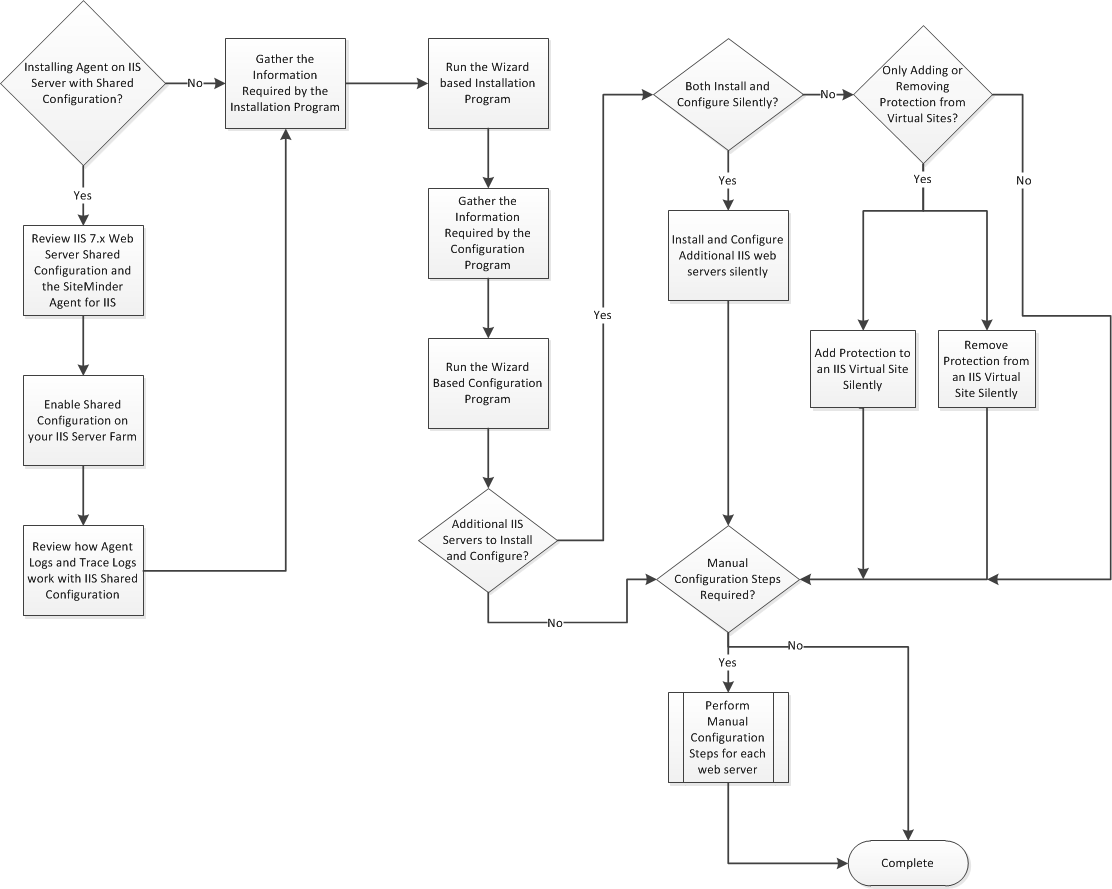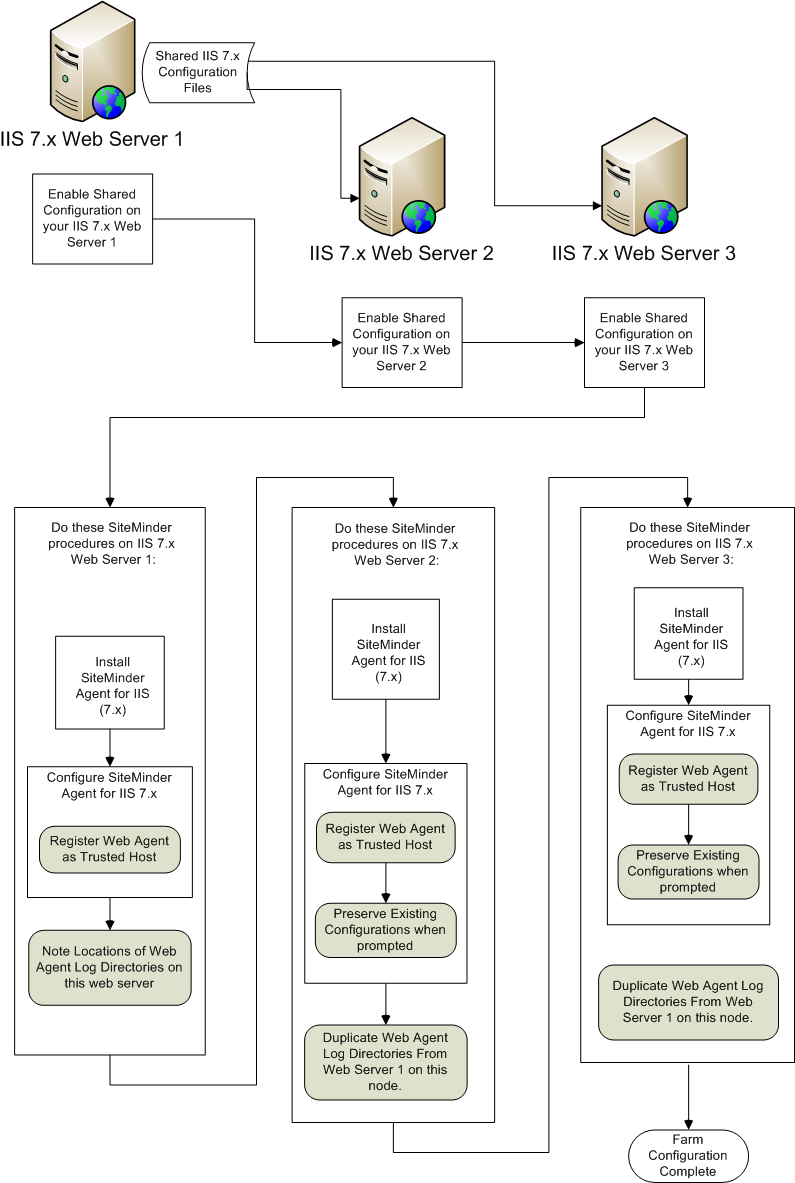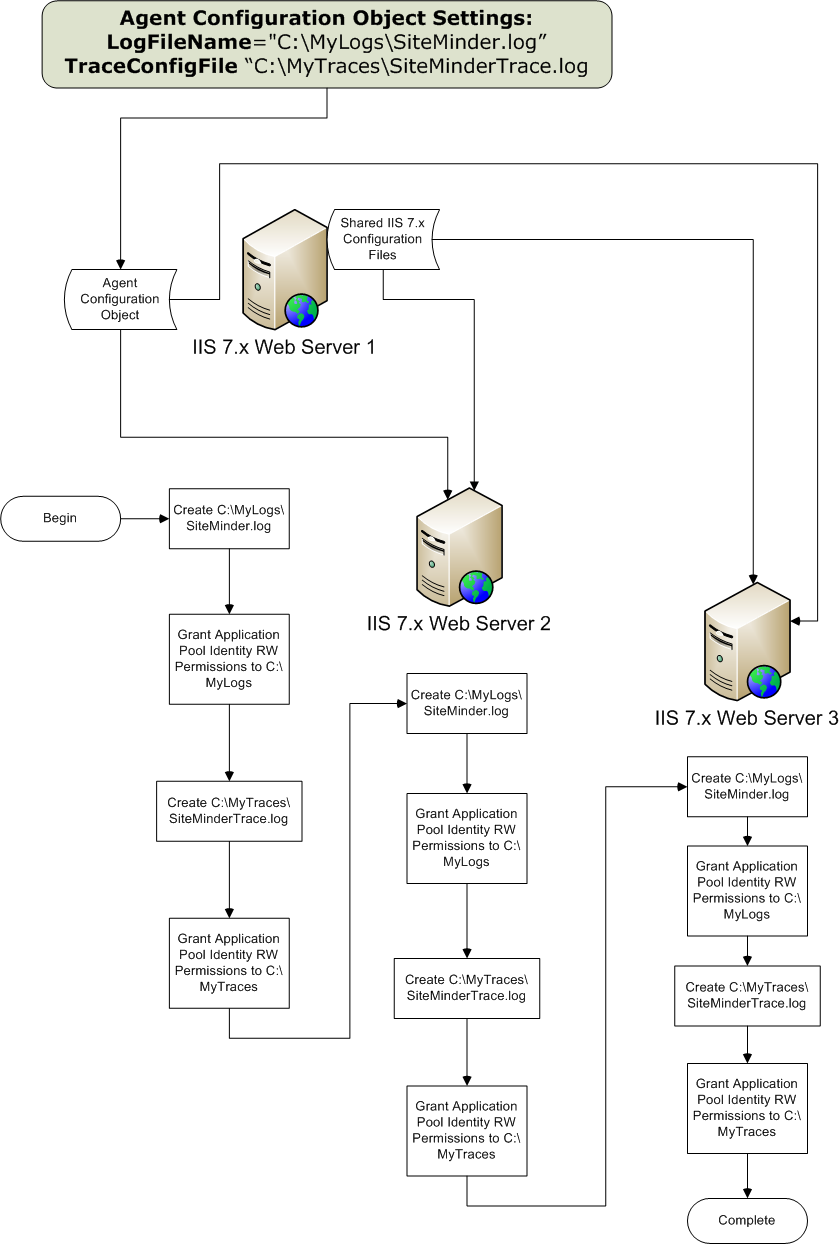

This section contains the following topics:
Agent Installation Compared to Agent Configuration
Apply the Unlimited Cryptography Patch to the JRE
Configure the JVM to Use the JSafeJCE Security Provider
Agent for IIS Installation and Configuration Roadmap
How to Install and Configure a SiteMinder WSS Agent for IIS
How to Configure Certain Settings for the SiteMinder WSS Agent for IIS Manually
The concepts of installation and configuration have specific meanings when used to describe CA SiteMinder® agents.
Installation means installing the CA SiteMinder® agent software on a computer system. For example, installing an agent creates directories and copies the CA SiteMinder® agent software and other settings to the computer.
Configuration occurs after installation and means the act of preparing the CA SiteMinder® agent software for a specific web server on a computer. This preparation includes registering the agent with CA SiteMinder® Policy Servers, and creating a runtime server instance for the web server that is installed on the computer.
Use the wizard-based installation and configuration programs to install and configure your agent on your first web server. The wizard-based programs create a .properties file.
Use the .properties file and the respective executable file to install or configure the agent silently on additional web servers.
Patch the Java Runtime Environment (JRE) used by the Agent to support unlimited key strength in the Java Cryptography Extension (JCE) package. The patches for all supported platforms are available from the Oracle website.
The files that need to be patched are:
The local_policy.jar and US_export_policy.jar files can found be in the following locations:
jre_home\lib\security
jre_home/lib/security
Defines the location of your Java Runtime Environment installation.
The SiteMinder WSS Agent XML encryption function requires that the JVM is configured to use the JSafeJCE security provider.
Follow these steps:
Is the installed location of the JVM used by the application server.
In the following example, the JSafeJCE security provider entry has been added as the second security provider:
security.provider.1=sun.security.provider.Sun security.provider.2=com.rsa.jsafe.provider.JsafeJCE security.provider.3=sun.security.rsa.SunRsaSign security.provider.4=com.sun.net.ssl.internal.ssl.Provider security.provider.5=com.sun.crypto.provider.SunJCE security.provider.6=sun.security.jgss.SunProvider security.provider.7=com.sun.security.sasl.Provider
Note: If using the IBM JRE, always configure the JSafeJCE security provider immediately after (that is with a security provider number one higher than) the IBMJCE security provider (com.ibm.crypto.provider.IBMJCE)
com.rsa.cryptoj.fips140initialmode=NON_FIPS140_MODE
Note: The initial FIPS mode does not affect the final FIPS mode you select for the SiteMinder WSS Agent.
The following illustration describes the process installing and configuring a CA SiteMinder® Agent for IIS:

Installing and configuring the SiteMinder WSS Agent for IIS involves several separate procedures. To install and configure the agent for IIS, use the following process:
IIS 7.x web servers support shared configurations that streamline the configuration process for an IIS a server farm.
Starting with CA SiteMinder® 12.52, the Agent for IIS can protect resources on IIS server farms that use the shared configuration feature of IIS 7.x.
Note: This feature works only with the CA SiteMinder® 12.52 Agent for IIS 7. Older versions of the CA SiteMinder® Web Agent do not support this feature.
IIS 7.x uses network shares to propagate the configuration information across the server farm. The CA SiteMinder® 12.52 Agent for IIS, however, cannot operate on network shares. Using a CA SiteMinder® 12.52 Agent for IIS on an IIS server farm involves several separate procedures.
For example, suppose you have three IIS 7.x web servers, with all of them using a shared configuration. Web server number one is your primary web server, which contains the configuration information for the farm. Web servers 2 and 3 are nodes that connect to the network share on web server one to read the configuration information.
The entire installation and configuration process for using the CA SiteMinder® Agent for IIS on all three IIS 7.x web servers is described in the following illustration:

For SiteMinder WSS Agents for IIS running on an IIS server farm, create duplicate log and trace file directories on each node if all the following conditions are true:
agent_home\log
Indicates the directory where the SiteMinder WSS Agent is installed on your web server.
Default (Windows 32-bit SiteMinder WSS Agent installations: C:\Program Files\CA\Web Services Security\webagent
Default (Windows 64-bit SiteMinder WSS Agent installations: C:\Program Files\CA\Web Services Security\webagent\win64
Default (Windows 32-bit SiteMinder WSS Agent installations operating on 64-bit systems: C:\Program Files (x86)\CA\Web Services Security\webagent\win32
If all of the previous conditions exist in your server farm, use the following process to enable your SiteMinder WSS Agent logs and trace logs:
For example, suppose you have three IIS 7.x web servers, with all of them using a shared configuration. Web server number one is your primary web server, which contains the configuration information for the farm. Web servers 2 and 3 are nodes that connect to the network share on web server one to read the configuration information.
The entire process for configuring these logs is described in the following illustration:

Before running the installation program for the CA SiteMinder® Agent for IIS on the Windows operating environment, gather the following information about your web server:
Specifies the location of the CA SiteMinder® agent binary files on your web server. The web_agent_home variable is set to this location.
Limit: CA SiteMinder® requires the name "webagent" for the bottom directory in the path.
Specifies the location in your Start menu for the shortcut for the Web Agent Configuration wizard.
Before configuring a SiteMinder WSS Agent on an IIS web server, gather the following information about your CA SiteMinder® environment.
Indicates whether you want to register this agent as a trusted host with a CA SiteMinder® Policy Server. Only one registration per agent is necessary. If you are installing the CA SiteMinder® Agent for IIS 7.x on an IIS server farm, register all IIS agents in the farm as trusted hosts.
Limits: Yes, No
Specifies the name of a CA SiteMinder® user account that has sufficient privileges to create and register trusted host objects on the Policy Server.
Specifies the password that is associated with the CA SiteMinder® user account that has sufficient privileges to create and register trusted host objects on the Policy Server.
Confirms the password that is associated with the CA SiteMinder® user account that has sufficient privileges to create and register trusted host objects on the Policy Server.
Indicates whether the Policy Server generates a new shared secret when the agent is registered as a trusted host.
Specifies a unique name for the host you are registering. After registration, this name appears in the list of Trusted Hosts in the Administrative UI. When configuring a CA SiteMinder® Agent for IIS on an IIS web server farm, specify a unique name for each IIS server node on the farm. For example, if your farm uses six servers, specify six unique names.
Indicates the name of the Host Configuration Object that exists on the Policy Server.
Specifies the IP addresses of any Policy Servers to which the agent connects. Add a port number if you are not using the default port for the authentication server. Non-default ports are used for all three Policy Server connections (authentication, authorization, accounting).
Default: (authentication port) 44442
Example: (IPv4) 127.0.0.1,55555
Example: (IPv6) [2001:DB8::/32][:55555]
Note: If a hardware load balancer is configured to expose Policy Servers in your environment through a single Virtual IP Address (VIP), enter the VIP. For more information, see the Policy Server Administration Guide.
Specifies one of the following algorithms:
Uses algorithms existing in previous versions of CA SiteMinder® to encrypt sensitive data and is compatible with previous versions of CA SiteMinder®. If your organization does not require the use of FIPS-compliant algorithms, use this option.
Allows a transition from FIPS-compatibility mode to FIPS-only mode. In FIPS-migration mode, CA SiteMinder® environment continues to use existing CA SiteMinder® encryption algorithms as you reencrypt existing sensitive data using FIPS-compliant algorithms.
Uses only FIPS-compliant algorithms to encrypt sensitive data in the CA SiteMinder® environment. This setting does not interoperate with, nor is backwards-compatible with, previous versions of CA SiteMinder®.
Default: FIPS Compatibility/AES Compatibility
Note: FIPS is a US government computer security standard that accredits cryptographic modules which meet the Advanced Encryption Standard (AES).
Important! Use a compatible FIPS/AES mode (or a combination of compatible modes) for both the CA SiteMinder® agent and the CA SiteMinder® Policy Server.
Specifies the name of the SmHost.conf file which contains the settings the Web Agent uses to make initial connections to a CA SiteMinder® Policy Server.
Default: SmHost.conf
Specifies the directory where the SmHost.conf file is stored. On Windows 64-bit operating environments, the configuration program creates two separate files. One file supports 64-bit applications, and the other file supports 32-bit applications running on the same web server.
Default: (Windows IIS 7.x 32-bit) agent_home\win32\bin\IIS
Default: (Windows IIS 7.x 64-bit) agent_home\win64\bin\IIS
Lists the web sites on the IIS 7.x web server that you can protect with CA SiteMinder®.
Appears when the CA SiteMinder® Agent configuration wizard detects one of the following situations:
Select one of the following options:
Replaces the previous configuration of the CA SiteMinder® Agent with the current configuration.
Keeps the existing configuration of your CA SiteMinder® Agent. No changes are made to this web server instance. Select this setting for each web server node if you are configuring the CA SiteMinder® Agent for IIS 7.x on an IIS server farm.
Removes the existing configuration of a CA SiteMinder® Agent from the web server. Any resources are left unprotected by CA SiteMinder®.
Default: Preserve
Important! Do not configure and unconfigure virtual sites at the same time. Run the wizard once to configure the sites you want, and then run the wizard again to unconfigure the sites you want.
Specifies the name of an Agent Configuration Object (ACO) already defined on the Policy Server. IIS web servers in a server farm using shared configuration support sharing a single ACO name with all IIS servers in the farm.
Default: AgentObj
Note: We recommend printing a copy of the CA SiteMinder® Agent Configuration Worksheet to record this information for future reference.
Install the SiteMinder WSS Agent using the CA SiteMinder® Web Services Security installation media on the Technical Support site.
Follow these steps:
Specifies the cumulative release number. The base 12.52 release does not include a cumulative release number.
The CA SiteMinder® Web Services Security installation wizard starts.
Important! If you are running this wizard on Windows Server 2008, run the executable file with Administrator permissions, even if you are logged into the system as an Administrator. For more information, see the CA SiteMinder® Web Services Security Release Notes.
Note: If the installation program detects that newer versions of certain system DLLs are installed on your system, it asks if you want to overwrite these newer files with older files. Select No To All if you see this message.
The SiteMinder WSS Agent files are copied to the specified location.
If the installation program detects that there are locked Agent files, it prompts you to restart your system instead of reconfiguring it. Select whether to restart the system automatically or later on your own.
Important! For SiteMinder WSS Agents for Web Servers installed on IIS servers, reboot your system after installation; it is not sufficient to restart the IIS service. Also, do not configure the Agent immediately after installation; there are some tasks you must do before configuring the Agent.
If you selected the option to configure SiteMinder WSS Agents now, the installation program prepares the CA SiteMinder® Web Services Security Configuration Wizard and begins the trusted host registration and configuration process. Use the information that you gathered earlier to complete the wizard.
If you did not select the option to configure SiteMinder WSS Agents now, or if you are required to reboot the system after installation, run the configuration wizard manually later.
Installation Notes:
Specifies the path to where CA SiteMinder® Web Services Security is installed.
Default: C:\Program Files\CA\Web Services Security
Specifies the date and time that the SiteMinder WSS Agent was installed.
The Agent cannot communicate properly with the Policy Server until the trusted host is registered.
After gathering the information for your Agent Configuration worksheet, run the Agent Configuration wizard. The configuration wizard creates a runtime instance of the agent for IIS on your IIS web server.
Running the configuration wizard once creates a properties file. Use the properties file to run unattended configurations on other computers with same operating environment and settings.
Note: The configuration wizard for this version of the Agent for IIS does not support console mode.
Follow these steps:
WSS_Home\install_config_info
Specifies the path to where CA SiteMinder® Web Services Security is installed.
Default: C:\Program Files\CA\Web Services Security
Important! If you are running this wizard on Windows Server 2008, run the executable file with administrator permissions. Use these permissions even if you are logged in to the system as an administrator. For more information, see the release notes for your CA SiteMinder® component.
The WSS Agent Configuration wizard starts.
|
Copyright © 2013 CA.
All rights reserved.
|
|